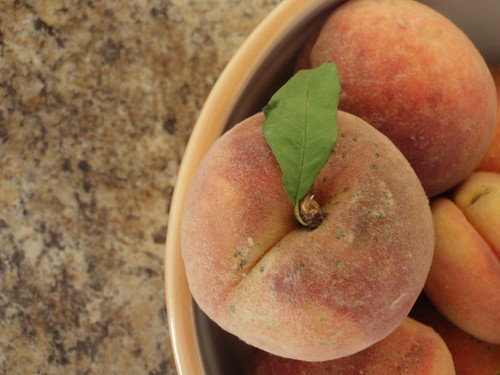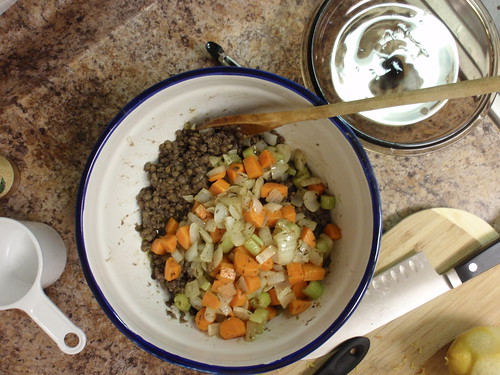I listen to a lot of podcasts these days. At work, at home, while cooking, while washing dishes—I love a good podcast. Recently, thanks to a thread on Get Off My Internets, I discovered Colleen Patrick-Goudreau’s podcast, Vegetarian Food for Thought, and in a word, it’s wonderful. (See, Raquelita, GOMI isn’t all snarking and insults! Good things can be hidden among all the catfighting.)
I listen to several foodie podcasts, but Vegetarian Food for Thought is the first and only vegetarian podcast I’ve enjoyed. It’s refreshing to listen to a show where the host never talks about food that I can’t eat for ethical reasons. As a vegetarian, you get used to living in a world where many things are off-limits to you, food-wise, and it’s a relief when those barriers are removed. It’s like eating at a vegetarian restaurant and being overwhelmed with delight at seeing a menu where everything is an option. I have become resigned to eating out and seeing a handful of choices, at most, that I can eat. It’s really exciting when that’s not the case. It’s also really exciting to take carnivores to a vegetarian restaurant and seeing them eat happily.
I’ve been a vegetarian for a long time now, and I feel pretty set in my ways. Listening to Colleen’s podcast has inspired me to revisit the reasons behind my vegetarianism. I originally stopped eating meat because I was horrified to learn how factory-farmed meat is really processed. I felt I could not support an industry that was so damaging to the environment and so brutal to its animal and human participants. But I never stopped eating all animal products; I never gave up cheese or eggs. I suppose I struck a compromise between my ethics and my appetite: I won’t eat meat, but I’m not giving up my dairy or my eggs.
I consider myself an environmental vegetarian, which means I do it because it’s a more sustainable option. Colleen is a vegan for compassionate reasons—compassion for animals and a belief that it is wrong for humans to exploit animals for their bodies. On principle, I don’t think it’s wrong for humans to exploit animals, but I admit that it’s a relief to know that animals are not being killed so that I can eat them. For me, the fact that vegetarianism is more compassionate than eating meat is a sweet bonus.
Making Rachel’s lentil dish, an easy and very tasty favorite of mine. And it’s vegan!
Despite my lacto-ovo ways, I’ve put Colleen’s book Vegan’s Daily Companion on my Amazon wishlist. It’s a cool idea: “365 days of inspiration for cooking, eating, and living compassionately” says the extended title. Can’t we all use a little more compassion in our days? And this book seems like my favorite kind of cookbook, the kind with lots of stories and tidbits in addition to some recipes.
I know I’m rambling a bit today, but I wanted to mention a few things in particular that have stuck with me from the podcasts. Consider them points of interest, whether or not you agree.
* I’m glad she took Michael Pollan to task about his meat-eating. It’s been a long time since I read The Omnivore’s Dilemma, but I remember finding his discussion of vegetarianism profoundly unsatisfying. Seriously, it’s not that hard to be vegetarian. Really, it’s not. If you want to eat meat because you like the taste and texture of meat, then just admit that your meat-eating is about pleasure and familiarity and not some lofty ideal about our evolutionary history or family traditions. And about the latter: I think you can call yourself vegetarian even if at holidays, you eat brisket or turkey or whatever. I don’t think fear of family holiday meals is a good reason to cling to meat-eating if vegetarianism appeals to you for ethical or health reasons.
* Also, Michael Pollan is the not the Messiah of food. He’s a good journalist, but he’s no god.
* I loved her episode “The Lethal Gifts of Livestock,” in which Colleen discusses our long history of acquiring pathogens because of our animal husbandry. She also talks about the recent food contamination scares and influenza outbreaks and expresses her rage that the media never seems to mention the fact that these pathogens exist because of animal husbandry. And let’s not forget all the cases of food poisoning from tainted meat. Afterward, officials tell us to cook our beef thoroughly, but do they ever offer another solution: don’t eat beef?
* As an aside, the scientist in me wants to point out that even though we acquired smallpox from cattle (first came cowpox, then smallpox), cowpox also inspired the first vaccine. Benjamin Jesty, an English farmer, noted that milkmaids who contracted cowpox seemed to be immune to smallpox. This observation prompted him to use cowpox as a crude vaccine against smallpox; his work was later repeated by Dr. Edward Jenner, who is much more famous than Jesty for his work on smallpox vaccinations. (Thanks, Wikipedia!) So from the source comes the solution, at least for smallpox.
* I like how Colleen tells her story about feeding her pet cats in “What do Vegetarians Feed Their Cats and Dogs?” It’s a serious issue, as cats are obligate carnivores who do not thrive on a vegetarian diet. That, at least, seems to be the consensus opinion. Colleen admits to feeding her beloved cats meat, citing some of the health problems they experienced while on a vegetarian diet. I admire her honesty here, as this is a tough subject, especially for compassionate vegans.
* Colleen claims we like butter, cheese, and meat because fat and salt taste good. Period! No other reasons! I completely disagree. Cheese and meat in particular are incredibly complex, flavor-wise. There is a lot more going on in them than just fat and salt. Umami, anyone? But I think it’s even more than just the umami factor. I can tell you, as a vegetarian who occasionally tastes meat from someone else’s plate: there are things about meat that are not replicated in plant-based foods, with the exception of some of the crazy fake meats that Alice & Friends Vegetarian Cafe, a Chicago restaurant, serves up. Fake duck? Fake rabbit? It’s kind of mind-blowing. The popularity of fake meats and cheeses and the sheer variety of vegan milks available indicates that our cravings and our pleasure are much more than just fat, salt, and sugar.
Food for thought indeed.
Two last things before I go:
1) The Michael Pollan-inspired episodes include “The Rise of the Excuse-itarians,” “The Fall of the Excuse-itarians,” and “The Moral Crusade Against Foodies.” I found all three of these episodes fascinating and recommend them highly. Even if you don’t agree with Colleen’s position, she argues so eloquently that it’s worth listening.
2) All the Vegetarian Food for Thought episodes can be downloaded for free through iTunes. It’s a listener-supported program. I’m thinking about making a donation.



2 comments:
sounds like an interesting podcast! i tend more towards vegetarian these days, but I still enjoy meat every once in awhile... now caring about the meat i'm eating.
I'm glad to hear it, Shannon! I know that vegetarianism is not for everyone, but I think we should all be concerned about our food. For the most part, Colleen does a great job of discussing the issues.
Post a Comment